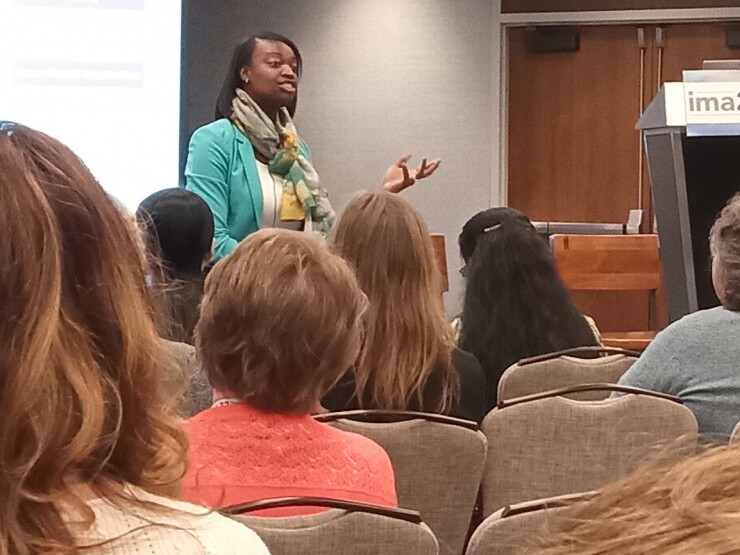Accounting and finance departments are hoping to diversify their workforce, especially with the ongoing shortages of young accountants joining the profession, but one segment of the population that's often left out of the discussion on diversity, equity and inclusion is "neurodiverse" or "neurodivergent" people.
They include people who are on the autism spectrum, such as those with Asperger's syndrome, or who have other conditions such as Tourette's syndrome, attention deficit hyperactivity disorder, dyslexia, dyscalculia, dysgraphia, neurological illnesses and brain injuries.
During a session Tuesday at the Institute of Management Accountants' conference in Minneapolis, a group of researchers from the IMA cited statistics from the Centers for Disease Control estimating that neurodivergent persons make up 15% to 25% of the global population. While most diversity-related research focuses on gender, race and ethnicity, some organizations are trying to foster inclusion of neurodivergent talent, partly in response to regulations and laws aimed at protecting people with disabilities.
Many neurodivergent people feel excluded, experience performance challenges and fear, and sometimes face discrimination in the workplace, according to an earlier study, and without effective strategies to attract and retain neurodivergent talent, the accounting profession risks losing a sizable portion of its potential workforce.
The IMA sent out an inclusion survey and heard from 1,252 respondents, with 94 of the surveyed identifying themselves as neurodiverse. The survey went out to different parts of the world, but the institute did 37 follow-up interviews with neurodivergent talent in the U.S.
"Our goal was we wanted to understand the lived experience of neurodivergent accountants and secondarily what's needed for them to feel a greater sense of belonging in the profession and in their specific workplaces," said Loreal Jiles, vice president of research and thought leadership at the IMA.

The researchers asked questions such as "What does inclusion look like to you in the workplace?" and "What kinds of challenges do you face in the workplace that don't allow you to feel a sense of belonging and to have a culture of inclusion?"
"But before that, we want to also understand, do you really feel included?" said Susie Duong, director of research at the IMA. "Or do you have a sense of belonging in your organization, as well as in the wider accounting profession?"
She played back audio clips of their responses using a computer-generated voice to protect the confidentiality of the interview subjects.
"I need a lot of regular feedback to reinforce the feeling of inclusion," said one interviewee.
"In my current organization, I have a sense of belonging in the context that everything is coming from the top leadership with respect to emphasis on diversity, equity and inclusion and relevant initiatives," said another interviewee. "However, on the ground level, I don't feel included. Although I don't feel explicitly excluded on my engagement teams, I don't necessarily feel that I belong amongst the people that I work with. This is because I struggle with being told to do certain things related to organizational culture that are imposed on us, such as having video on during virtual meetings with team members and things like that. But that's not the only way to connect teams. I feel like there is a disconnection between what's coming from the top such as trying to keep things flexible, keep people included, etc., and what's happening at the team level."
Neurodiverse or neurodivergent people may need special accommodations to do their work, such as allowing them to be separated by some distance from loud co-workers whose conversations can be distracting, as well as flexible work hours, flexible work deadlines, remote work, and more autonomy on how to get work done and connect with others. They may have difficulty with using videoconferencing apps like Zoom or Microsoft Teams for meetings.
However, none of that means that businesses have to lower expectations of them.
"This positive culture that we create is in no way saying you reduce standards," said Roopa Venkatesh, director of the School of Accounting at the University of Nebraska at Omaha. "It's in no way saying that you don't hold people accountable. Nor are we saying that everyone must follow a certain path to complete a task."
Employers need to provide anonymous opportunities for team members to offer feedback to management on how to make the work environment more flexible for neurodiverse talent — and just asking the question can be helpful.
"Having an open door policy as a leader is incredibly important," said Jiles. "If you have an open door policy, then people feel more comfortable giving feedback. For some of the interviewees here, the ones who had positive stories, their leaders asked. Their leaders had conversations with them. They made them feel like they wouldn't get in trouble. They made them feel like the goal of the interaction was how I can help you achieve what it is that you need to achieve."




